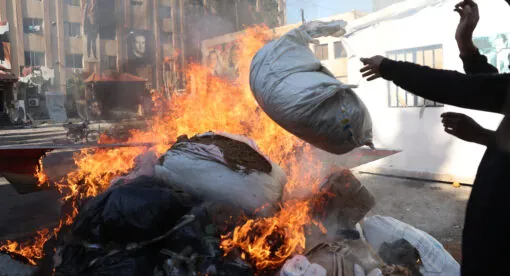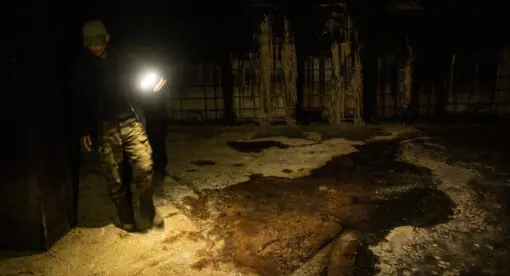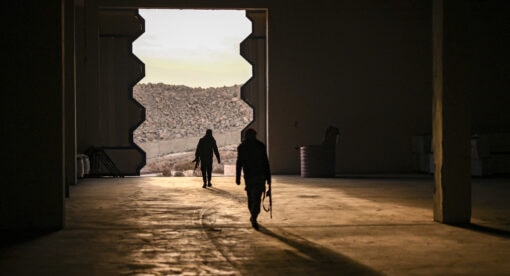Any day now, the U.S. government will release its interagency strategy to combat captagon, as mandated by the late-2022 Captagon Act. In this Contours episode, Host Carolyn Moorman discusses with Director Caroline Rose and Non-resident Senior Fellow Dr. Karam Shaar how this strategy can be expected to address the trade and its evolution in the midst of an environment where multiple Arab nations are taking steps toward normalization with the very regime that is producing the drug.
Carolyn Moorman:
Hello, and welcome to the Contours Podcast by the New Lines Institute for Strategy and Policy. This is your host, Carolyn Moorman. In today’s episode we’ll be discussing the Captagon trade with Caroline Rose and Dr. Karam Shaar. Caroline and Karam specialize in research in Captagon, the synthetic amphetamine drug that has eclipsed the Middle East, Asia, and parts of Europe for years. In 2022 alone, we saw at least 370 million pills seized in the Middle East, with this figure only representing a portion of the total amount that went unreported and undetected. The trade has caused major geopolitical ramifications that New Lines has sought to understand through its in-house product on the trade and the multiple landmark products we’ve released since April 2022.
Before we start, a little bit about our guests. Caroline Rose is the Director of the Strategic Blind Spots Portfolio, which includes the projects on Captagon, and a project on post-withdrawal landscapes. Prior to joining the Institute, Caroline was an analyst at Geopolitical Futures, where she focused on developments in the Mediterranean and the Levant. She is the author of Newlines’ 2022 special report on Captagon, which was a culmination of her studies and her work within the International Drug Policy Unit’s Middle East Initiative at the London School of Economics.
Dr. Karam Shaar is a non-resident senior fellow at New Lines where he focuses on illicit narcotic flows in their nexus with security and political systems in the Middle East. Dr. Shaar is also a consultant on Syria’s political economy and an establishing partner at the Observatory of Political and Economic Networks. He also previously served as the research director of the Operations and Policy Center. Before focusing solely on Syria and the region, he worked as a senior analyst at the New Zealand Treasury, a researcher at the Reserve Bank of New Zealand, and a senior lecturer on the Arab-Israeli conflict at Massey University. Caroline and Karam, thank you so much for joining the podcast.
Dr. Karam Shaar:
Thanks for having us.
Caroline Rose:
Yes, thank you Carolyn.
Carolyn Moorman:
So Caroline, I’d like to start with you. You and Karam have been studying Captagon for a very, very long time, swimming in the data, really understanding both the on the ground aspects of the trade and also these bigger geopolitical ramifications. It’s really started to grow in magnitude lately. Simultaneously, we’ve seen a lot of Arab states start to move towards normalization with the Assad regime, which is widely known to be producing Captagon. Developments like Syria regaining its full-fledged membership in the Arab League further underline this process. Are these two aspects of normalization and Captagon production related?
Caroline Rose:
Sure, I think that’s a great question and something that has been understandably raised as we’ve seen more countries opening their door to the Syrian regime. I wouldn’t necessarily credit the Captagon trade to being the reason why we’re seeing this huge rush to normalize with the Syrian regime. I think that there are other factors and incentives that have been driving this approach for a very long time, and it accelerated after the tragic earthquake earlier this year in southern Turkey and northern Syria.
However, I think that we’ve started to see the Captagon trade and more broadly counternarcotics collaboration, elevated to one of the top agenda items in normalization discussions for a number of reasons. One, because of the agitation many neighboring countries have received with the Captagon trade, notably countries like Jordan that have experienced sometimes violent counter-Captagon clashes with smuggling networks, but then also destination markets like Saudi Arabia that are very overwhelmed with the influx of Captagon pills.
And there are some very valid concerns regarding the security implications of the Captagon trade, and that has elevated Captagon as an agenda item. But one of the reasons why I think it is so high on the negotiation agenda list is because it’s considered a bit more feasible to implement and also an opportunity for countries that are looking to speed up the normalization process to demonstrate the regime’s goodwill. So for example, it’s very easy for the regime to change its numbers and its data and increase interdictions related to the Captagon trade, and that could be data that could be presented to skeptics of normalization to show the regime is “serious” about cracking down on the Captagon trade. So I think that many countries see Captagon as a portal, in many ways, to building momentum for additional normalization agenda items.
Carolyn Moorman:
Thank you, Caroline, for outlining that. I really liked your ending remarks about how Captagon is seen as a portal, for other states, to represent that Assad is taking steps towards becoming a regional player, again, towards rejoining all of these efforts, to become a more fruitful member of society. Once again, Karam, you and Caroline both recently published a report with New Lines called, The Syrian Regime’s Captagon Endgame, where you expose the clear difference between what the Syrian regime says and what it actually does. With normalization being a spectrum, as Caroline has outlined, do you honestly believe that steps in this direction by the Arab states in the region, will lead to a decrease in Captagon production by the Assad regime?
Dr. Karam Shaar:
That’s a very difficult question, and I think if you look at what the regime might actually do and say, the regime is being offered a bad deal and therefore it will continue to sponsor the Captagon industry and benefit from it economically and accept the price of being isolated. On the other hand, you can say that, the industry – accept the bounties offered by Gulf States and be willing to let go of the economic revenues that’s come from Captagon.
I think neither of these are actually going to happen. So the regime is going, I believe, to crack down on the industry, but only small actors, fringe actors, arrest some of them, act as if it’s genuine in its fight against Captagon and at the same time, continue to sponsor the big fish in the industry, which are intimately connected to the regime, so that it can get the funds from Captagon and the recognition and funds from Gulf States. I think it’s yet to be seen how the regime’s going to interact with the Captagon industry and the recent moves towards normalization, but having seen how the regime interacted with previous crises, I think it will be playing games with Gulf States.
Carolyn Moorman:
Thank you, Karam. I really appreciate you highlighting the low probability that the Assad regime would actually cut down on this trade, due to the large economic benefits it receives from the drug. I’m curious, as you’ve spent so much time looking at this data throughout the Middle East, especially in Syria and the region, and with the production of Captagon being the highest in the areas of Syria that the Assad regime controls, I’m wondering, what can you tell us about the findings of Captagon in areas not controlled by the Assad regime?
Is there any production happening there? And I’m wondering if you have any thoughts on how the situation in Syria, besides tit for tats and a lot of talk, we have not seen the control of the land, anything like that change in a while. And I’m wondering if you think that any kind of changes in SDF territory, in Turkish territory, and insomuch as the Assad regime regaining territory, do you think that would be a line to draw to more Captagon production?
Dr. Karam Shaar:
If you allow me to take a step back – historical context. After Captagon was banned in the ’80s, its illicit production moved to Eastern Europe, and primarily Bulgaria was the main producer. Years later, it moved into Turkey, with consumer markets continuing to be the Gulf States, countries in the Arabian Peninsula. Over the past decade, that production started moving closer to consumer markets and started to happen in Syria and Lebanon. And it was five or six years ago when the Assad regime realized that there is a political opportunity there for it to sponsor the production, help it become on an industrial scale, so that it can be weaponized against Gulf States. And that’s exactly what happened. That’s when production skyrocketed, especially over the past three to four years actually.
So now, if you look at the data and focus on seizures, seizing authorities in consumer markets specify clearly where Captagon originated from. Nearly 70% of Captagon is produced or originates from regime-held areas, and another 10% from neighboring Lebanon. However, there’s also limited evidence that Captagon is being produced in other countries, such as India, for example.
That in mind, I think I can answer your question. The knowhow is available. Areas outside regime control, especially the areas in the northwest, do know how to produce Captagon. And there has been, some labs in that area have been detected, especially in the areas of the Syrian National Army controlled by Turkey. However, their production is actually very limited to the regime. What you would expect to happen if the Assad regime magically, that’s not expected to happen, but if the Assad regime decides to crack down on the industry, you’d expect that production to move elsewhere because they have the knowhow, say in northwest Syria, to produce it. Economically, it’s very feasible, and they know how. It looks like there is no political sponsorship in those areas for the production of Captagon. However, if there is no sustainable solution to the Captagon crisis, I don’t see why they can’t also turn into producers of Captagon.
Carolyn Moorman:
You’ve really put the situation into perspective of how dynamics on the ground are bigger than just the Assad regime producing Captagon, where there’s a potential, we haven’t seen as much evidence of it, but there’s a potential for other actors in Syria to produce this. And the longer the crisis continues without effective stop measures, the more this is going to become a regional and global crisis.
So Caroline, I’d like to turn to you and look at how this trade is affecting Syria’s neighbors. You wrote a trade analysis for New Lines in early April that emphasized the trend of the Captagon trade using networks through the transit countries of Iraq and Turkey to continue to spread the drug into Europe, and further into the Middle East. How has this development unraveled since the Captagon trade began, and how should this shift the way the US government and its allies view the Captagon trade?
Caroline Rose:
Certainly. So I would like to start off and say that the Captagon trade, it’s been prevalent in the Middle East for decades, and since it moved from the Balkans into the Middle East and more specifically into the Levant. Turkey was not immune to the Captagon trade during that shift. But as you mentioned, Carolyn, what we found in data, and there are a lot of different patterns that you can see with seizures and how Captagon is spilling into new transit markets.
Like any illicit economy, these traffickers and smugglers are becoming much more sophisticated and advanced in trying to target new transit markets, identify new routes, and then also try and carve out new consumption markets. And this is all due to an uptick in interdiction capacity in the Gulf and new constraints that have been placed around these traffickers. So they’re adapting and they’re adopting new methods. And I think it’s extremely important for the United States and its partners to recognize this.
And while we’ve seen the United States and its partners wake up to the Captagon trade as it relates to the Syrian regime and to Hezbollah and its partners, which is extremely important, because they’re using this trade as an alternative revenue stream, but then also of course, as a political leverage card in negotiations. But we’re also starting to see this realization of Captagon as a formidable illicit threat and an illicit economy that is quickly adapting and growing beyond its original contours in the Middle East. And it’s something that is not extremely easy to predict, especially with the sophistication of smuggling that we’re seeing. Also, the fact that there are proven destination markets, but also the fact that this drug can easily adapt and shift to accommodate for new markets as well.
This is something that is considered a risk, a public health risk, a security risk, and also a risk for law enforcement and rule of law. So this is something that I think the United States and its partners both in the region but also in Europe, are really trying to adapt and adopt new strategies to confront. This is both in terms of interdiction, but then also trying to increase tools and resources for addressing consumption and harm reduction as well. So this is something that’s really shifting fast, and while we’ve seen a US-led interagency Captagon strategy, it’s very important that the United States and its partners stay on top of this trade and don’t fall behind.
Carolyn Moorman:
So I’d like to continue on that note, Caroline. You mentioned how the countries around Syria with the help of US, Europe, are looking at the tools and resources that can be used to counter Captagon, but there’s always going to be this idea of there’s only so much that can be done if the Assad regime continues to produce this drug.
So Karam, you’ve been following these regional activities that are being done with the trade, such as Jordan and Iraq establishing counter-narcotics working groups. You’ve seen these countries seem to view normalization as a step to countering the drug, because they’ve tried so many things and nothing seems to be working. So these countries are seeing, not all of them, but a majority of them, are seeing normalization as the next thing to try. What steps do you think these nations should be taking, kind of along the route that Caroline started to talk about, given the Assad regime’s centrality to the problem itself? Or do you think steps like these are meaningless and not addressing the root of the problem, will just continue to make this bigger?
Dr. Karam Shaar:
I think we first need to acknowledge that countries affected by the Captagon trade do understand what’s happening in Syria. They do know that the Syrian regime is sponsoring the industry. And with that in mind, I think we can view the mechanisms that they have come up with recently – that is, the one between Jordan and the Syrian regime, and the other one between Iraq and the Syrian regime – I think we can view these as parts of the big puzzle. These countries do appreciate that Assad regime is sponsoring the industry. However, they do also see value in working with it on certain aspects. And I must say, I agree with them. At the end of the day, working with the Assad regime on sharing intelligence can be actually useful even when you know that they’re not being transparent, even when you know that the regime is sponsoring the industry.
Say Jordan stopped a shipment coming from Southern Syria and they arrested the two people. If they shared these names with the Syrian regime and said, “Could you please tell us more about these two? Who are their business partners? What businesses do they own in Syria? What are their other activities? Tell us about their criminal history.” Whether the Syrian regime answers these questions or doesn’t, that would be helpful for the Jordanian authorities. Because even if the regime does not answer these questions, then the Jordanians can say, “Look, you see, we’re trying to work with you and you’re not cooperating.” However, that advantage of working with the Syrian regime operationally and on a low level should not be compensated with political concessions to the regime. So yes, that can have limited benefits to countries affected by the Captagon trade. However, they should not be compensating the regime financially for that, or, basically, killing the political process in exchange for that.
Carolyn Moorman:
It’s interesting how you highlight that really hard place that a lot of these countries are in, because they know what the problem is, but yet, as you talked about, they are out of options and they know that tactically and operationally, the Assad regime can be of help of them. But then also, to actors like the United States that are continuing to push back against these normalization efforts, these political efforts with the Assad regime, they know that these efforts to engage with the Assad regime put the Assad regime more into this kind of limelight and give them more power over what is continuing to happen.
Caroline, next week marks the 180 deadline mandated by the Captagon Act for multiple US government agencies, including State, Treasury, et cetera, to announce a counter-Captagon strategy to Congress. This strategy should use a plethora of the US government’s diplomatic and economic assets to address the network and individuals producing and spreading Captagon. What are some recommendations that you are hoping are in this strategy, and do you think the steps that multiple countries have taken towards normalization with the Assad regime since the Captagon Act came out initially, have put more pressure on the US government during the creation of the strategy itself?
Caroline Rose:
I think it’s an exciting time, given all of these different geopolitical shifts, for the United States to really get ahead of this trade and also introduce a very proactive tool, not only when it comes to countering the Captagon trade, but also just narcotics and illicit economies in the region. So this I think is going to be a really crucial step that the United States and its partners are going to be coming forward, of course, first with this inter-agency strategy announcement next week. And I think that it’ll be very important that the United States incorporate this recent kind of obstacle of normalization and they interweave that into the strategy. And as Karam mentioned, and I completely agree with him, being able to catch the Syrian regime and a number of its strategies to have its cake and eat it too, trying to play the region, use this as a leverage card, create goodwill or an impression of goodwill, while also not really cracking down on the trade.
I think this strategy will be an important platform for the United States and its partners, to keep accountability on the regime and call it out when it perceives any differences in the statistics and the data that’s reported versus the actions that are really taken on the ground. And so I think that this strategy can build quite a bit of momentum for greater regional collaboration and beefing up interdiction capacity, bolstering accountability on the actors involved. This of course includes the Syrian regime, but also other peripheral actors like Hezbollah and other militias that are participating in the trade, in addition to other non-state actors that are involved in the production side, the trafficking side, and even the consumption side. I also think that the United States would be extremely smart to incorporate a counter-Captagon regional framework with trusted stakeholders and countries that are affected by the Captagon trade. And I think that this inter-agency strategy is an excellent first step in doing so.
And then finally, we’ve seen some sanctions that have been imposed that can tighten the screws around the United States’ Syria policy, but then also how it deals with the Captagon trade. They were announced March 28th. The initial list that was put out was quite strong, but of course, there are more and more individuals that are associated with the Captagon trade. So I think it’ll be very important. And one element of the strategy, to really keep track and monitor the list of names, entities, and other figures that are very heavily involved in Captagon production and trafficking.
Carolyn Moorman:
I think I can say collectively that everyone is incredibly excited and very interested in what the government’s going to release with this counter-Captagon strategy. I’m very interested, I bet, as both of you are, to see how all of the different agencies can work cohesively, as a whole, to battle this drug. I want to thank you both so much for coming onto the podcast. It was wonderful to speak about the Captagon trade as well as the wonderful work that you both have done on the trade for New Lines and for other organizations. To our listeners, make sure to subscribe to Contours on major streaming platforms, including iTunes, SoundCloud, and Spotify, so you don’t miss any of our new podcasts. You can also check out further analysis into geopolitics and US foreign policy at www.newlinesinstitute.org. All the best.







